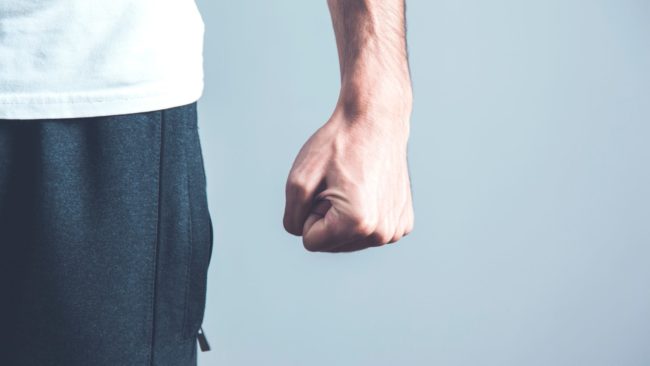
In a world where men often don’t have an outlet for their emotions, Chris Hemmings is hoping for change.
Bought up within a social construct that means boys and men don’t discuss their feelings, emotions become stuck inside and, Chris believes, come out as aggression, anger and even suicide- the biggest killer of men under 45.
Chris works with businesses, schools and private clients to try and help men find an outlet and challenge negative ideas about masculinity. He talked to Dad Info about how men can challenge the negative expectations of them and find outlets for their emotions.
Conditioned from birth
‘As a society, we train young men to be unemotional, strong and brave and tough,’ he says. ‘In essence, what we are doing is teaching men the outward expressions of emotions are unacceptable for them.’
Chris believes that aggression in men- e.g. the fights outside pubs on Friday nights- is a symptom of men being unable to get in touch with their feelings and express them in healthy ways. Women generally have a culture of talking to each other about their troubles, which is a helpful way to alleviate stress. Chris is hoping to push for a cultural mindshift wherein men can chat to their mates in the same way.
Why men struggle with their feelings
‘If men feel sadness, then they feel shame about that sadness. We deal with the shame by pushing the sadness down. But the sadness hasn’t gone,’ explains Chris. ‘The sadness has stayed with us and it crystallizes, and then we wonder why it roots us in violence- aggression and anger.’
Stuck between struggling with their feelings and having no outlet, it’s no surprise that many boys and men resort to negative behaviour, or are unable to cope.
The groundwork is laid in boyhood
Chris is a psychologist and works directly with not only schools but also individual young clients. He has noticed how often boy’s friendships are based on what is often referred to as ‘banter’, but in actuality is constant put-downs to each other. ‘All of the young lads I see talk to me about having low self-esteem,’ notes Chris. ‘And I’m like, well, yeah, because everything that you do is mocked by your friends. You’re not encouraging each other. You’re not supporting each other. You have male camaraderie, which is great. But you are creating a society of men with really low self-esteem.’
‘Every single man that I know at some point in his life early on has been told not to feel his emotions. Then think about what that does for society- we wonder why there’s so much anger and aggression.’
Pent up stress= violence
Chris points out that many men have either been punched, attacked or hit someone else at some point in their lives, perhaps at school or on an evening out. ‘Very few women that I know have have been the victim of physical violence like that,’ he says. ‘I’ve had my nose broken by some random bloke in a case of mistaken identity. We don’t talk about the reality that many men have either thrown a punch or had one thrown at them.’
Chris believes strongly that there needs to be a cultural shift towards recognising the damaging messages that are fed to boys from birth and changing the narrative. ‘We as men need to start recognizing that we are responsible for the future of our sons,’ he explains. ‘We have to start addressing these things and stop normalizing these behaviours.’
Men speaking up
Chris has found that men often don’t attend counselling sessions until they’re in crisis, and even then they struggle to get in touch with their feelings.
The NHS reports that only 36% of referrals to talking therapies are for men- yet men are 3 times more likely to commit suicide than women. Suicide is the biggest killer of men under the age of 45- many of whom will be dads. Furthermore, 3/4 of those who go missing in the UK are men, and men are 3 times more likely than women to become dependent on alcohol or drugs. The need for men to have an outlet for their difficulties, therefore, could not be more vital.
How men can get more in touch with themselves- Chris’ tips
Acknowledge and accept you have emotions and feelings
‘You have been brought up in a society that’s told to you that you’re not allowed to have feelings,’ points out Chris. ‘So that’s the first thing- an acceptance of that- that you do and can have feelings.
‘For example, anxiety is a healthy, natural expression of uncertainty. But you don’t want to admit that you have anxiety because you think that that makes you feel weak. But it doesn’t, it makes you human. I’m not saying that strength and toughness and bravery as traits for men are inherently negative because they’re not. You can use that bravery- the bravest thing you will ever do as a man is ask somebody for help.
‘We think it’s safer for us to suppress emotions in the long run. It’s not. And that’s why the suicide rate is so high. That’s why so many male suicides seem to happen out of the blue. But they don’t- that man didn’t wake up one morning and decide to end his life. That man has been going through turmoil internally, but we just didn’t know about it yet.’
Listen to fellow men without judgement
Chris urges men to not only try to talk to each other but also be sympathetic listeners. Creating your own support network with your friends or male relatives can be life-changing.
Taking the first step can be tricky but also become a lifeline through the difficult times. To begin talking to a mate, Chris suggests acknowledging that the first occasion might be awkward. ‘I always say to men you are going to feel dumb, you’re going to say some dumb crap that’s going to make you both feel really, really awkward. But acknowledge that at the start. Go and sit with the pain, look each other in the eye and say, mate, what the hell are we doing? I don’t know how to do this. I know you don’t know how to do this, but can we start trying? This is the only way you get there- by practicing. That’s it.’
Small changes can kickstart changed lives
Chris believes that if men communicated together and were more supportive of each other then society would change for the better. ‘If we can start to increase the number and volume of compassionate, empathetic male role models in society, into actually actively helping each other tangibly and actively to be to take better care of ourselves we can encourage magic,’ he says.
‘It’s the gas mask on a plane analogy. Putting an oxygen mask on first before you tend to others. At the moment, we’re telling men to tend to everybody else. We’re not wearing our own oxygen masks. There are a lot of men out there who are terrified, who are hurting, who are anxious. The basics of it is to start treating men as if they’re human. We have to start doing that for ourselves.’
Find out more
Visit Chris’ website
Buy Chris’ book
Visit our friendly forum to chat to other dads







